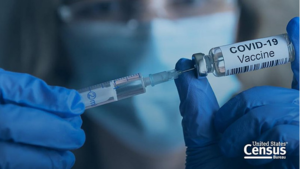COVID-19 vaccines: Difference between revisions
(Upload Image) |
(x) |
||
| Line 1: | Line 1: | ||
[[File:Covid vaccine.png| | [[File:Covid vaccine.png|300px|thumb|COVID-19 Vaccine]] | ||
'''Coronavirus disease 19''' or '''coronavirus''' has a range of different [[vaccine]]s available, and the vaccines work using many different methods including old, well-established technologies like inactivated vaccines, newer viral vector vaccines, and mRNA engineering vaccines. | '''Coronavirus disease 19''' or '''coronavirus''' has a range of different [[vaccine]]s available, and the vaccines work using many different methods including old, well-established technologies like inactivated vaccines, newer viral vector vaccines, and mRNA engineering vaccines. | ||
Revision as of 15:45, January 20, 2022
Coronavirus disease 19 or coronavirus has a range of different vaccines available, and the vaccines work using many different methods including old, well-established technologies like inactivated vaccines, newer viral vector vaccines, and mRNA engineering vaccines.
Vaccine approvals[edit | edit source]
Some COVID-19 vaccines are now fully approved in certain countries, some approved for emergency use only after clinical trials, and a few COVID vaccines only permitted for experimental use (generally limited to Russia, parts of Eastern Europe, and parts of Asia). COVID-19 vaccines are designed to protect against the virus that causes COVID-19, preventing COVID-19 will also provide protection against Long COVID because it is only caused by COVID-19.[1]
ME/CFS[edit | edit source]
- Dec 2 2021, After Covid-19 Vaccination, Health of People with ME/CFS More Likely to Worsen Compared to Controls You + ME
About five months after receiving their first or only shot of Covid-19 vaccine, 19% of survey participants with ME/CFS indicated their health had worsened, 9% reported that it had improved and 73% responded that it had not changed.
This compares to 4% of controls (people who did not have ME/CFS) who said their health had worsened, 7% who indicated it had improved and 89% who reported it had not changed.
ME/CFS advice from specialists[edit | edit source]
- To Vaccinate or Not - with ME/CFS - Nancy Klimas, Nova Southeastern University
- Bateman Horne Center COVID-19 Vaccine Guide
- 25% ME Group (for severe ME), ME Association and Action for ME statement
- Covid-19 vaccines - Dr Charles Lapp
- ME Association
- Dec 2020, COVID-19 Vaccine - Center for Complex Diseases
- COVID-19 vaccine side effects poll results for ME/CFS - HealthRising
Immunocompromised people[edit | edit source]
People with ME/CFS have immune system dysfunction, but are not considered immunocompromised, instead many may have an overactive immune system.[citation needed]
People who are regarded as immunocompromised, such as those living with HIV, or who are immunosuppressed, such as whole organ or stem cell transplant or who are taking immunosuppressants are as significantly greater risk of severe illness from COVID-19, and they do not need to automatically avoid COVID-19 vaccination; the Pfizer/BioNTech, AstraZeneca/Oxford, and Moderna vaccines have been approved for use in these patients in the UK and none of these contain any active or live SARS-CoV-2 virus particles.[2]
Vaccines work better in people who are not immunocompromised or immunosuppressed, but these people are likely to achieve a lower lower of protection against COVID-19.[2] The British Society for Immunology recommend that immunocompromised and immunosuppressed people get a COVID-19 vaccine, and to have both doses, since this will still give some protection against COVID-19, and will help protect them from becoming seriously ill.[2]
People with stable HIV took part in the Pfizer-BioNTech and Moderna mRNA COVID-19 vaccine trials, although in general there is limited information on safety and efficacy of COVID-19 vaccines for immunocompromised and immunosuppressed people.[2]
Immosuppressants that may be used in people with ME/CFS include cyclophosphamide (a nitrogen mustard), dexamethasone, hydrocortísone, prednisolone and rituximab.[3][4]
See also[edit | edit source]
Learn more[edit | edit source]
- Jan 2021, The Coronavirus Vaccine Side Effects Poll for ME/CFS and Fibromyalgia - Health Rising
- Jan 2021, ME/CFS and FM Experts on Whether to Take the Coronavirus Vaccine – Plus The Vaccine Polls - Health Rising
Allergies and MCAS[edit | edit source]
- ACAAI Provides Further Guidance on Risk of Allergic Reactions to mRNA COVID-19 Vaccines - American College of Allergy, Asthma and Immunology
- ACAAI Provides Further Guidance on Risk of Allergic Reactions to mRNA COVID-19 Vaccines
- American College of Allergy, Asthma and Immunology COVID-19 vaccine recommendations
- Anaphylaxis (allergies) COVID-19 Vaccine advice - The Mast Cell Disease Society
- Covid-19 statement - The Mast Cell Disease Society and Physicians from TMS Medical Advisory Board
Immunosuppressant therapy and COVID-19 vaccines[edit | edit source]
- Mar 2021, Information on Vaccination Against SARS-CoV-2 - American College of Rheumatology guidance - for people on immunosuppressive therapy
General COVID-19 vaccine information[edit | edit source]
- CDC Allergic reactions to the Coronavirus Vaccine
- Who can take the Pfizer-BioNTech COVID-19 vaccine? - World Health Organization
- COVID B vaccination - National Health Service
- Public Health England COVID-19 vaccine leaflet
References[edit | edit source]
- ↑ "Information on Vaccination Against SARS-CoV-2" (PDF). American College of Rheumatology. March 2021.
- ↑ 2.0 2.1 2.2 2.3 https://www.immunology.org/news/bsi-statement-covid-19-vaccines-for-patients-immunocompromised-immunosuppressed
- ↑ "List of Immunosuppressants" (PDF). HSE (Ireland). Retrieved March 17, 2021.
- ↑ "Immunosuppressive Agents". DrugBank Online. Retrieved March 17, 2021.


